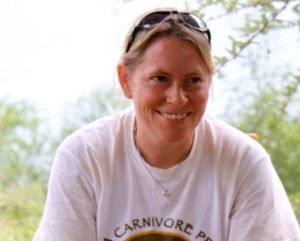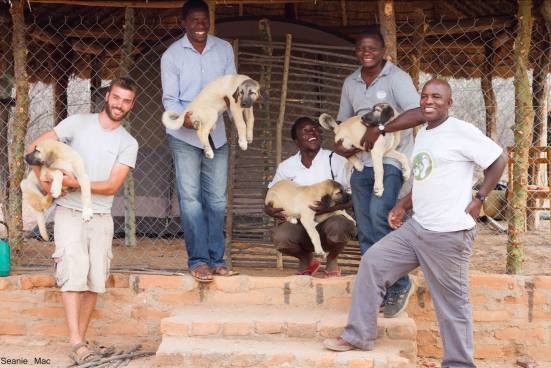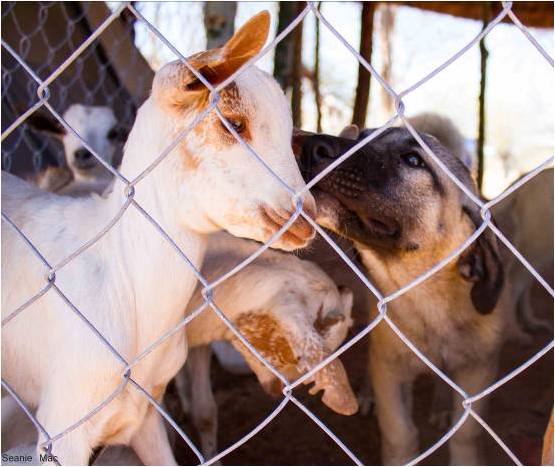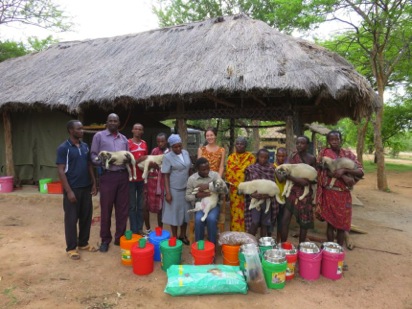Ruaha: Carnivore Project Update
By Amy Dickman – Ruaha Carnivore Project Director
In 2013, RCP initiated East Africa’s first trial of specialised livestock guarding dogs, to see if this method could help prevent livestock losses and carnivore killings. Supported mainly by the Taronga Conservation Society Australia and the Cleveland Metroparks Zoo, and in partnership with the Cheetah Conservation Fund (CCF), we placed pedigree, working-line Anatolian Shepherd dogs with local herds.
Expanding the Guarding Dog Programme
Our current livestock guarding dogs are now over a year old and are doing very well, so we decided that it was time to expand the programme. Therefore, this month we sent our collegue and research assistant Mgogo to the CCF headquarters in Namibia to be trained in all aspects of guarding dogs, and he had a wonderful time. We want to thank CCF very much for their fantastic cooperation in training and hosting Mgogo (as well as Msago in 2013), and for giving advice and organising the export and transport of the puppies.
Our new arrivals
The new arrivals meant that the camp was very busy this month, as we had the six new Anatolian Shepherd puppies as well as a training a herd of six goats roaming around. While Mgogo was in Namibia, Msago and the rest of the team had carefully selected the best candidates for receiving one of the new puppies – we were looking for local livestock keepers who had experienced significant livestock losses in the bush, in the hope that the dogs would lead to a substantial reduction in conflict. There is lots of local demand for these dogs now, but we selected five families which, excitingly, included the first Barabaig household to receive a guarding dog. We will be keeping one female Anatolian puppy at camp so that, if all goes well with this next phase, we can eventually set up our own breeding programme.
After a couple of days of acclimatization at camp, we held a seminar to inform the new dog owners about how to best care for their dog and how to train them to become good guarding dogs. Finally the dogs were handed over to their new Maasai and Barabaig owners, who named them and took them to their new homes.
Monitoring and training
If these dogs are to become effective guardians, it is critically important that they receive very good care and nutrition, especially in the first year. Therefore, we have an intensive monitoring programme where we check all puppies at least twice a week to monitor their health, ensure they are taken care of properly and help with the training. So far, the five new placed dogs – ‘Chui’ (which means leopard in Swahili), ‘Duma’ (which means cheetah), ‘Simba’ (which means lion), ‘John’ and ‘Special’ are all doing well. We are excited to watch them grow and we hope that they will soon effectively protect their herds against large carnivores, as this should reduce both attacks and retaliatory carnivore killings. The success of the programme is by no means guaranteed, but it is vital that we trial this method, and then we will be able to determine whether it is a valid, cost-effective technique. If so, it could potentially be applied in many other locations where conflict is a major problem for both people and predators.
 About Amy
About Amy
Amy has worked in carnivore conservation for 16 years, and in 2009 established Tanzania’s Ruaha Carnivore Project (RCP), located in one of the world’s most important and inaccessible wildernesses. The Ruaha area is globally valuable for threatened carnivores, but Amy discovered that lions were being killed there at a rate unmatched anywhere else in Africa.Over the past five years, Amy and her team have worked with many thousands of local people to reduce conflict and improve the situation. They have helped people better protect their livestock, developed extensive community healthcare and education initiatives to demonstrate tangible benefits from carnivore presence, and have built significant capacity and awareness through employment, training and education.
Read more about the Ruaha Carnivore Project.
See more of Kwihala Camphereand if you would like to make a booking to stay at Kwihala please contact your trusted travel agent or make an enquiry with us.
The post Ruaha: Carnivore Project Update appeared first on Asilia Africa.
More Wildlife & Conservation Articles

Leopard vs Cheetah : Can You Tell The Difference
01 April 2020How often do you mistake a leopard for a cheetah or vice versa? I’m sure we’v...

What’s the difference? National Parks, Game Reserves, and Conservancies in East Africa
02 February 2020To most of us, a national park, game reserve, or conservancy are all the same...

Electric Vehicles: The Future Of East African Safari Travel?
12 January 2020October 2019 saw the arrival of our first electric, solar-powered safari vehi...

Guest Gallery: The Serengeti At Its Best
27 November 2019We recently had the pleasure of welcoming guests, Chris and Monique Fallows t...









